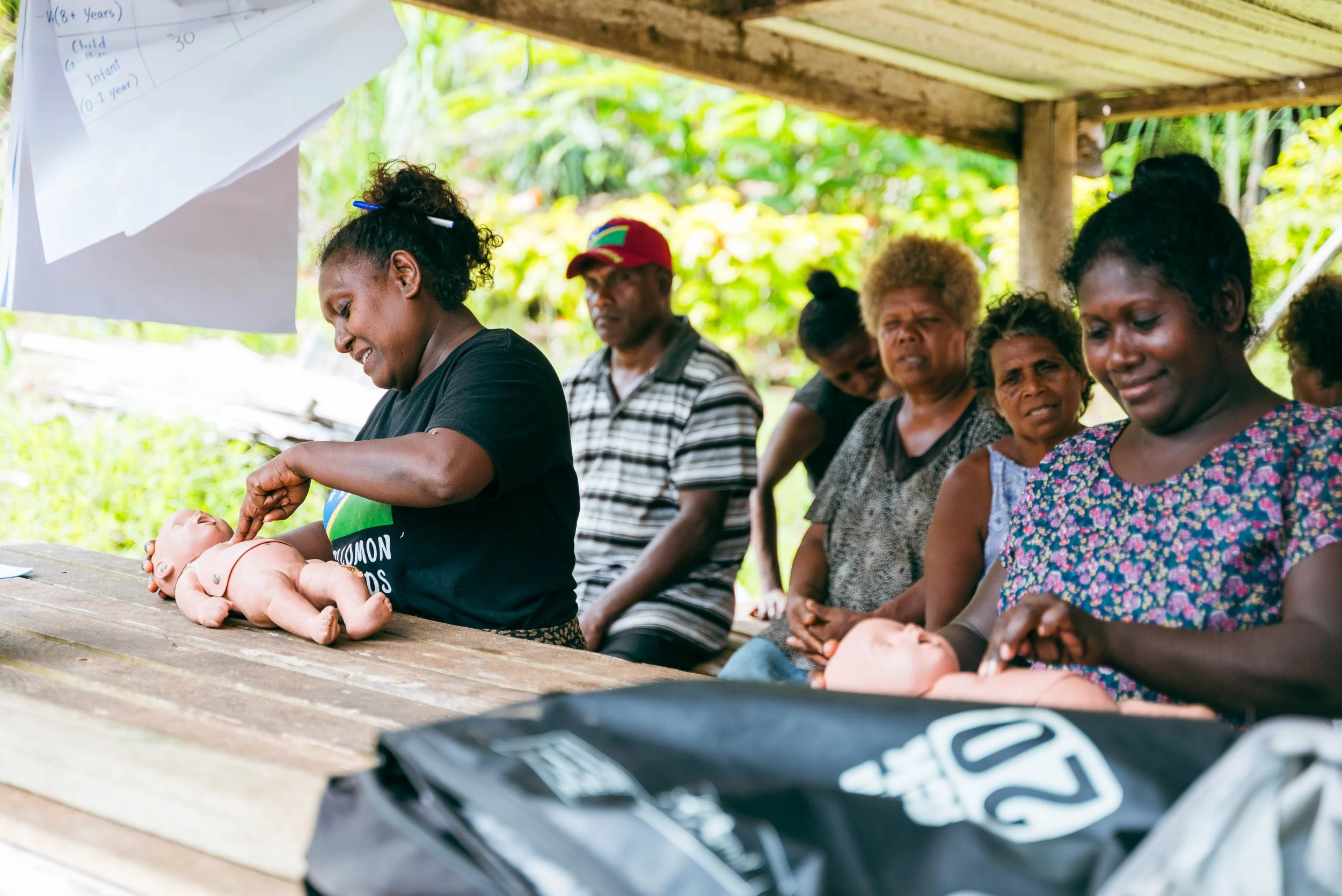First aid training will save lives in remote island communities
By Selric Faisi, DRCC Communications Coordinator, Solomon Islands
The community learned several first aid techniques, including how to properly apply bandages to wounds. IMAGE: Selric Faisi/on behalf of Plan International in the Solomon Islands
In the remote communities of Gatokae Island, nestled in the Marovo Lagoon of Western Province, first aid training has become a crucial step toward preparedness. Supported by the Australian Government’s Disaster READY program and implemented by Plan International in collaboration with the Solomon Islands Red Cross, the training has equipped local communities with skills that will save lives in emergencies.
Over two weeks, facilitators from the Red Cross delivered Community-Based First Aid ran trainings in eight communities. Each community received two full days of training, with two communities trained simultaneously. The sessions were open to all, ensuring that not just designated trainees but entire communities could benefit from the knowledge shared.
"With this knowledge of first aid, it will help them on a large scale with things they can do themselves to prevent death or mortality," said Freda Paiva, Disaster Risk Management Coordinator for Plan International. "We have a big aim for Disaster READY, which is actually to save lives, and first aid is one of the ways we can apply practical skills to save someone’s life."
For many participants, this was their first exposure to formal first aid education. The training covered essential skills, including how to manage injuries, stabilise casualties, and respond in medical emergencies. In remote areas like Gatokae, where access to healthcare is limited, these skills are invaluable.
Women and girls were encouraged to participate in the first aid training. IMAGE: Selric Faisi/on behalf of Plan International in the Solomon Islands
A youth member of the Village Disaster Climate Risk Committee in Kavolavata recalled a frightening experience when her young niece nearly drowned. "At that time, I wasn’t trained in first aid. I only followed what I’d heard from stories of others who faced similar situations. Thankfully, that knowledge helped save my niece," she shared. Reflecting on the incident, she understood the gaps in her response. "If I had known about first aid, I would have stayed calmer and avoided rushing. Panicking could have cost my niece her life," she explained.
Now equipped with proper training, she feels prepared for future emergencies. "This training has taught me what to do when someone is drowning. I’m confident I can apply these skills to help my family and community. First aid is vital because, in the past, many accidents led to loss of life simply because we didn’t know what to do."
Facilitator Frank Tuita from the Solomon Islands Red Cross highlighted why first aid is critical in disaster preparedness. "First aid plays a vital role in reducing the impact of emergencies. When disasters strike, trained individuals can take immediate action instead of waiting for external help—which, in remote areas like this, may take hours or even days," he said. "The communities were eager to learn. Many told us this was their first formal first aid program. Seeing their engagement and determination to absorb these skills was inspiring."
Community members learned how to administer first aid to infants. IMAGE: Selric Faisi/on behalf of Plan International in the Solomon Islands
With partnerships like the Red Cross and Plan International, Gatokae is becoming stronger and more empowered to respond to emergencies—whether during disasters or in everyday situations requiring first aid. By equipping individuals with practical skills, the initiative ensures that communities are not only prepared but also confident in their ability to save lives. "We feel very delighted and happy that this course was able to go ahead. It has provided every community with important lessons in first aid," Freda shared.
Through initiatives like Disaster READY, these trainings are fostering resilience in communities across the Solomon Islands—ensuring that even in the most remote areas, people are equipped with the knowledge and skills to respond effectively to emergencies.




